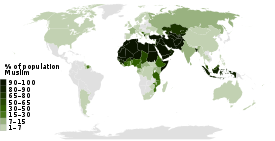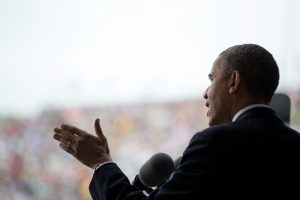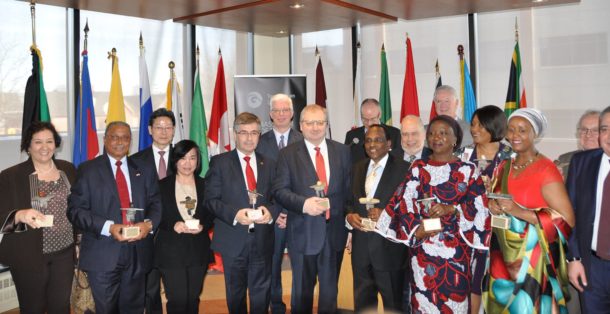Joshua Arnold, juicyecumenism.com, January 30 Image (not from entry) Wikipedia
Image (not from entry) Wikipedia
Islam has become a common tool of foreign policy, said Peter Mandaville and Shadi Hamid in an event hosted last week by the Brookings Institution. This reality presents new challenges to U.S. foreign policy efforts to promote democracy and religious liberty in areas of world where Islam is the dominant religion. Their full discussion with other panelists can be found here.Mandaville and Hamid recently co-authored a report titled, “Islam as Statecraft: How Governments Use Religion in Foreign Policy.” Back in September, Hamid argued that Western governments need to do a better job understanding Islamic culture in an interview with Providence: A Journal of Christianity and Foreign Policy.At the recent Brookings event, they said that governments in Muslim-majority countries have been forced to engage in religious dialogue as a matter of survival. Religion used to be less important to governments in Islamic countries, but the ideological power vacuum allowed extremist non-state organizations like al-Qaida or ISIS to promote their own version of Islam. The situation became critical during the Arab Spring, when popular but Islamist revolts actually overthrew regimes in Tunisia, Egypt, and, with Western aid, Libya—not to mention failed revolts in Syria, Bahrain, and other countries.According to their report, state promotion of Islam can take many forms. Countries like Jordan and Morocco promote a moderate form of Islam to reinforce the ruling dynasty’s legitimacy and control. Countries like Saudi Arabia promote a conservative form of Islam for the same reason. On the other hand, Turkey and Iran have both adopted Islamic rhetoric to bolster their regional influence among neighboring Muslim-majority countries, but willingly embrace historical instead of religious ties with neighbors where it boosts their influence. Their aggressive style pushes even more governments to engage in religious debate, lest they get cut out by their neighbors.But it’s not just governments; private charities and other religious groups, with more or less state support, are promoting their own versions of Islam according to their own agendas. Add to that other complexities, such as the Sunni-Shia divide that has fractured domestic and international relations for many countries. Muslims living in Muslim-majority countries have a buffet of Islam-specific options to choose from in determining their own personal beliefs.Why exactly is The Institute on Religion and Democracy, a Christian organization in Washington, D.C., interested in what Muslims are saying to each other about the correct version of Islam? We are concerned with religious freedom and democracy both at home and abroad. If what Mandaville and Hamid argue is true (a question well above my pay grade), then it could set back American efforts to promote these ideals in Muslim-majority countries.Without resorting to punitive measures such as invasion or sanctions, America has two main tools for effecting change abroad: direct diplomacy and public diplomacy [JB emphasis]. Direct diplomacy is what most people think of as diplomacy—direct communication between two governments. Public diplomacy is where a government communicates with the people in another country, instead of with the government. One example Hamid shared of current U.S. public diplomacy with the Islamic world is a kiosk at an Indonesian University where locals could learn about U.S. culture from an interactive computer.Historically (and constitutionally), the U.S. federal government has avoided theological disputes or other means of favoring one religion over another. It usually restricts itself to purely secular messaging.The challenge, say Mandaville and Hamid, is that Muslim governments have become quite savvy at public diplomacy—and use Islam as part of their strategy. In trying to convince a majority-Muslim population to adopt a particular way of thinking, a government willing to invoke Islam in its messaging has an enormous advantage over a government that employs only secular messaging. In essence, the Muslim government tells ordinary citizens: “as a Muslim, you should think this way.” Meanwhile the U.S. government tells them: “as a secular liberal, you should think this way.” The ordinary citizen then thinks: “Well, I am not a secular liberal, but I am a Muslim, so I know which way to think now.” Obviously the situation is more complex, and there are multiple competing messages coming from Islamic governments, but that only further disadvantages the U.S. efforts to persuade.How, then, will the U.S. promote democracy and religious liberty in Muslim majority countries? If public diplomacy is an unprofitable method, perhaps we can employ traditional diplomatic means. But that would either require us to coax allies to advance a favored religious message, or choose our allies based on their religious message, which seem antithetical options to the American spirit. And let’s not forget that most regimes promoting a brand of Islam are doing so primarily to preserve their undemocratic regime. Even in Muslim-majority countries that do adopt a democratic government, Mandaville and Hamid point out that does not necessarily translate into respect for religious freedom; oftentimes the democratically elected government embraces conservative Islamist rule.Today, Christians suffer persecution in many Muslim-majority countries—8 out of the top 10 on Open Doors’ 2019 World Watch List, and in nearly 20 others. Unfortunately, the U.S. government is not well-equipped to persuade Muslim populations or states to embrace religious freedom in Islamic terms.What can the U.S. do to promote religious freedom or democracy in Muslim-majority countries? It looks like creative and innovative new solutions are needed.Original Article
State Promotion of Islam: a Challenge for Religious Liberty
Views: 4












